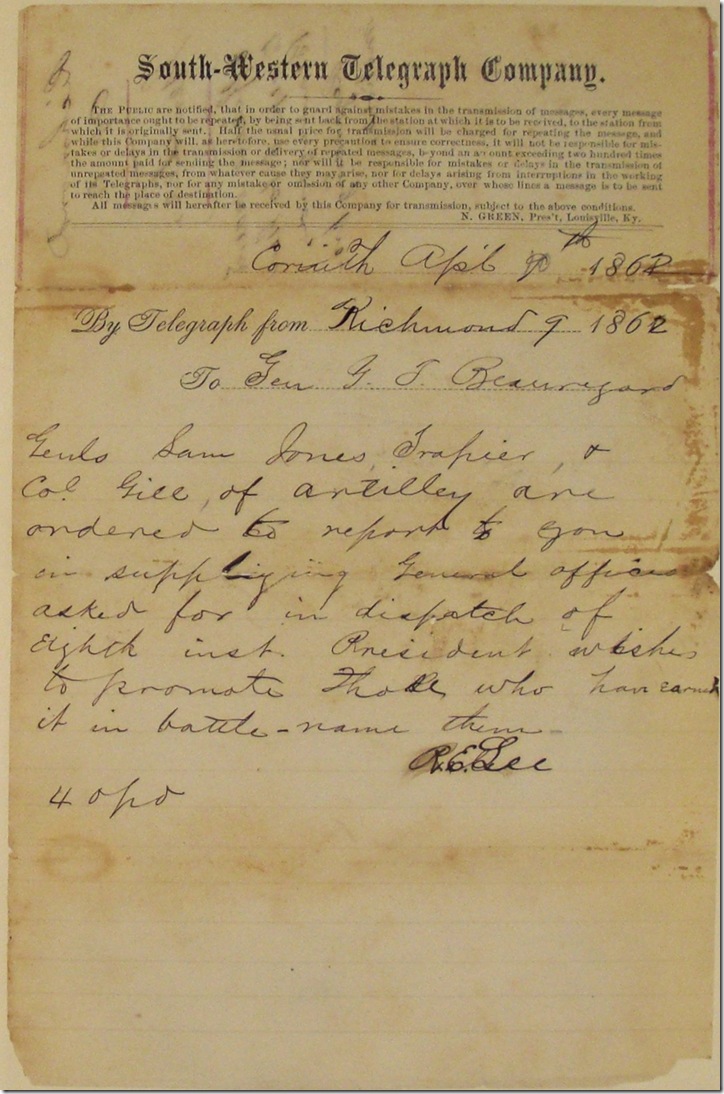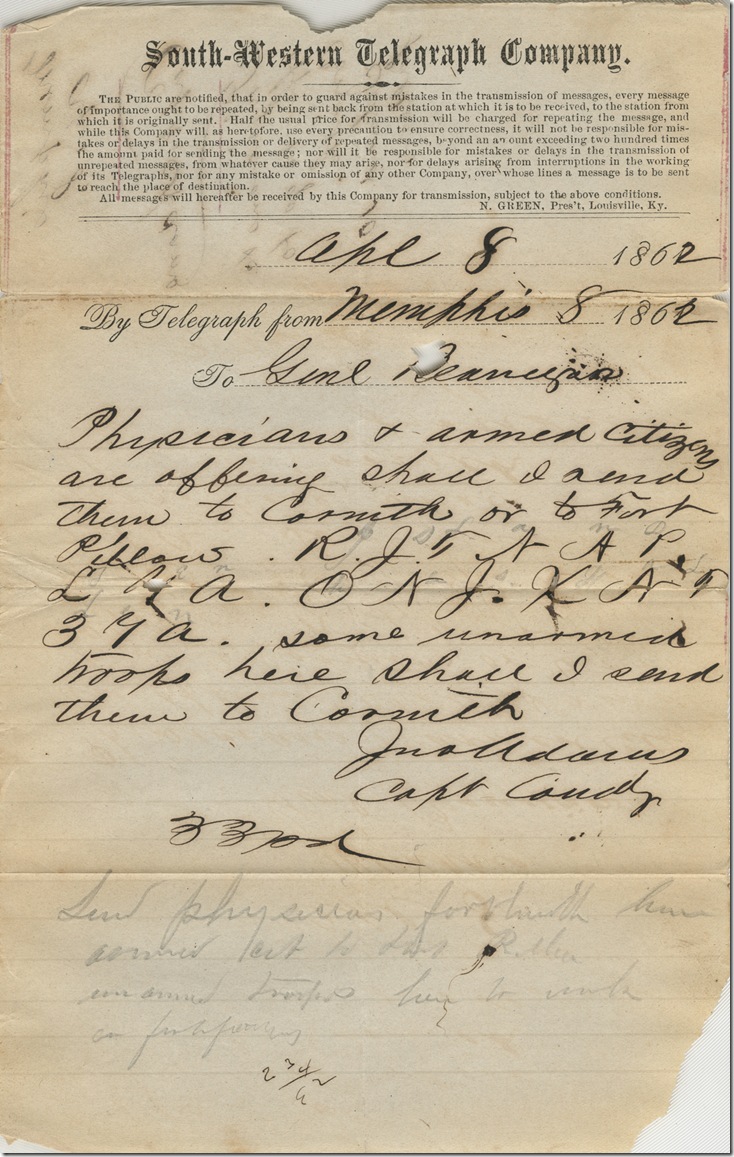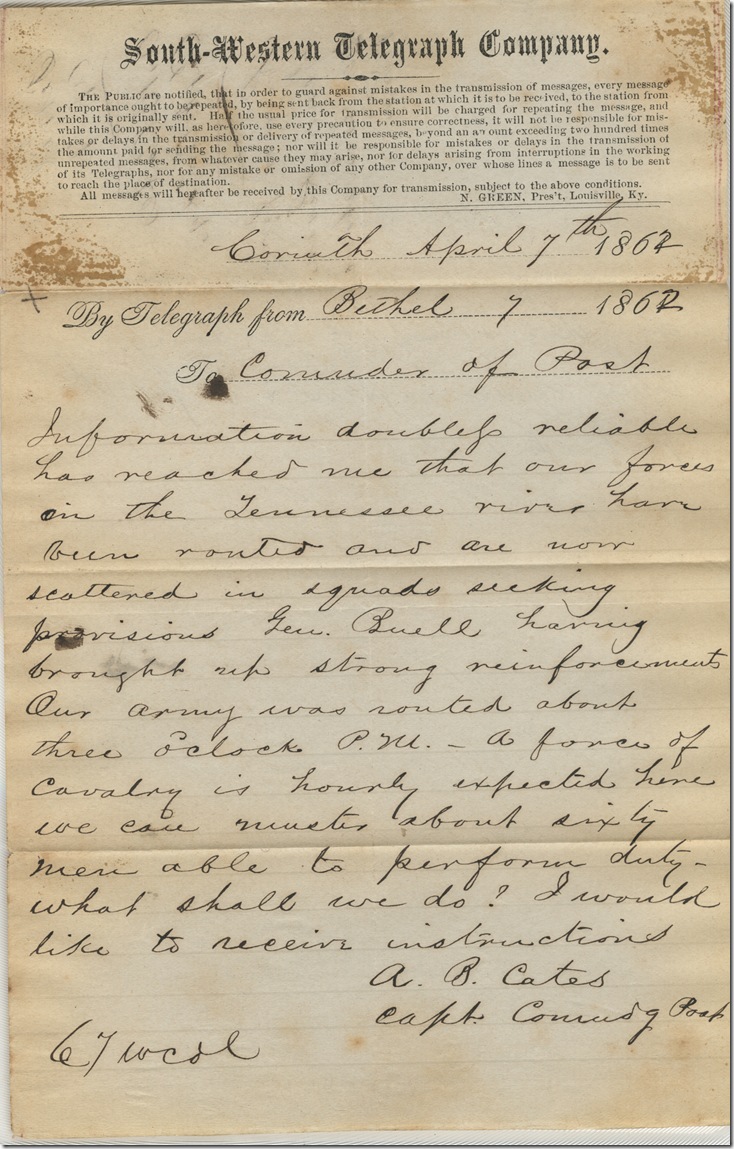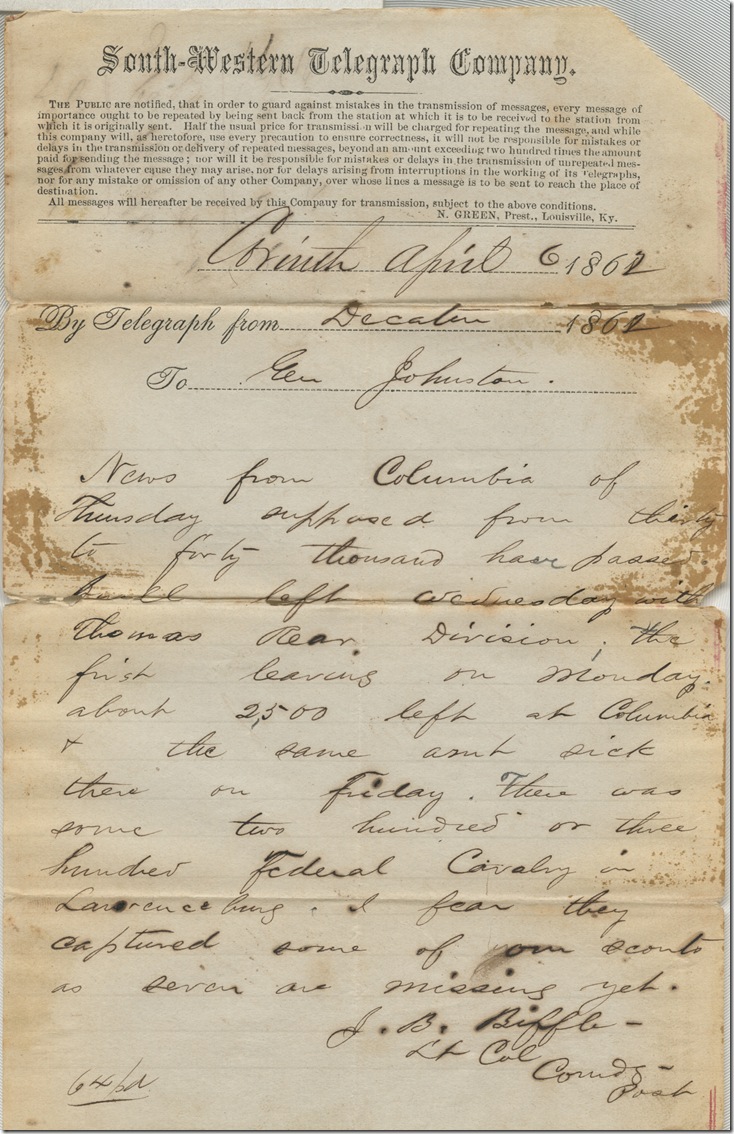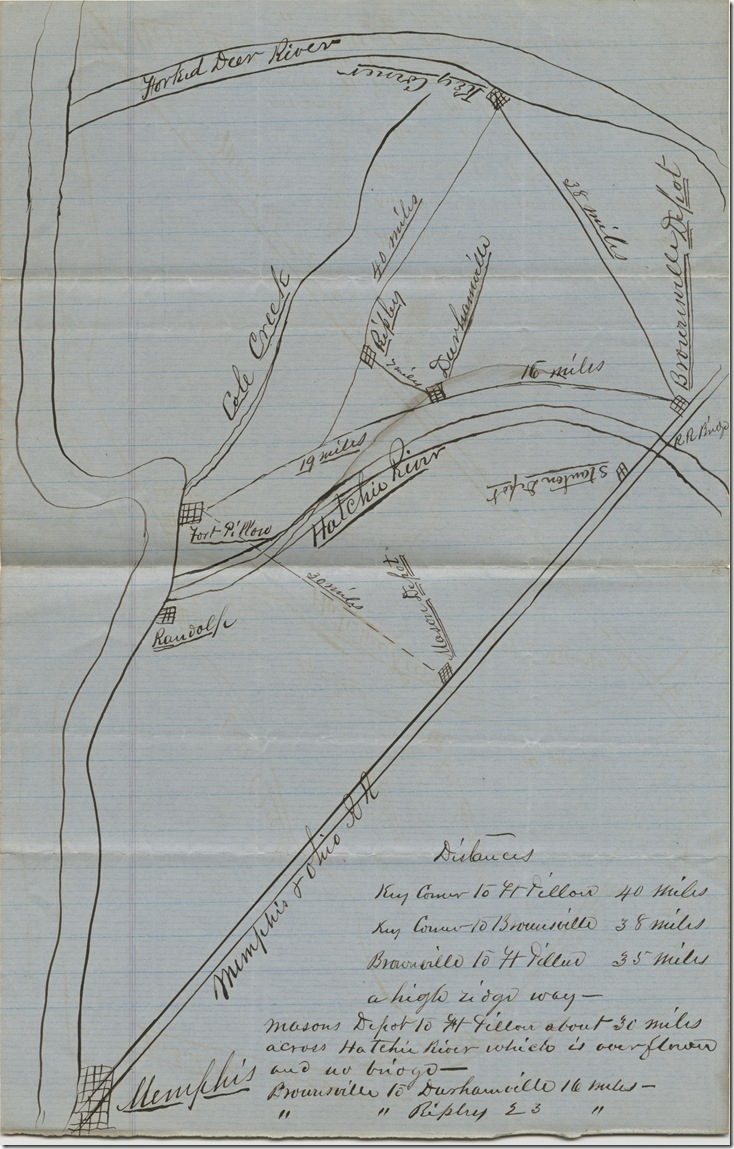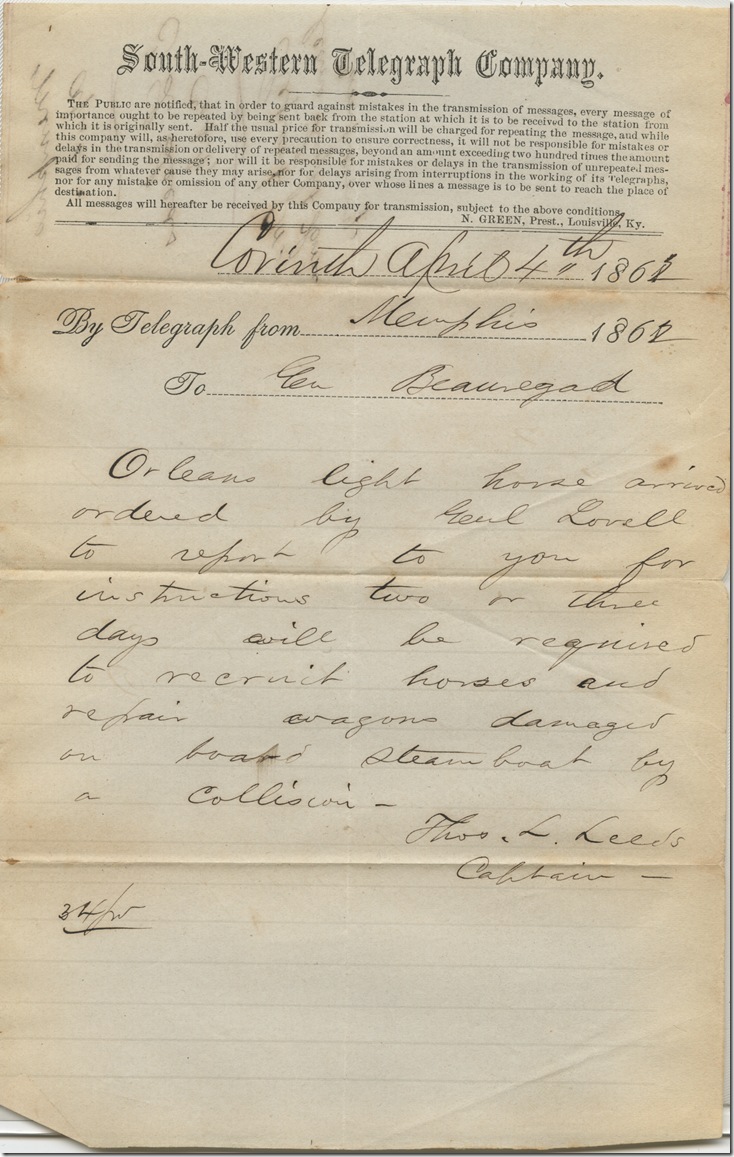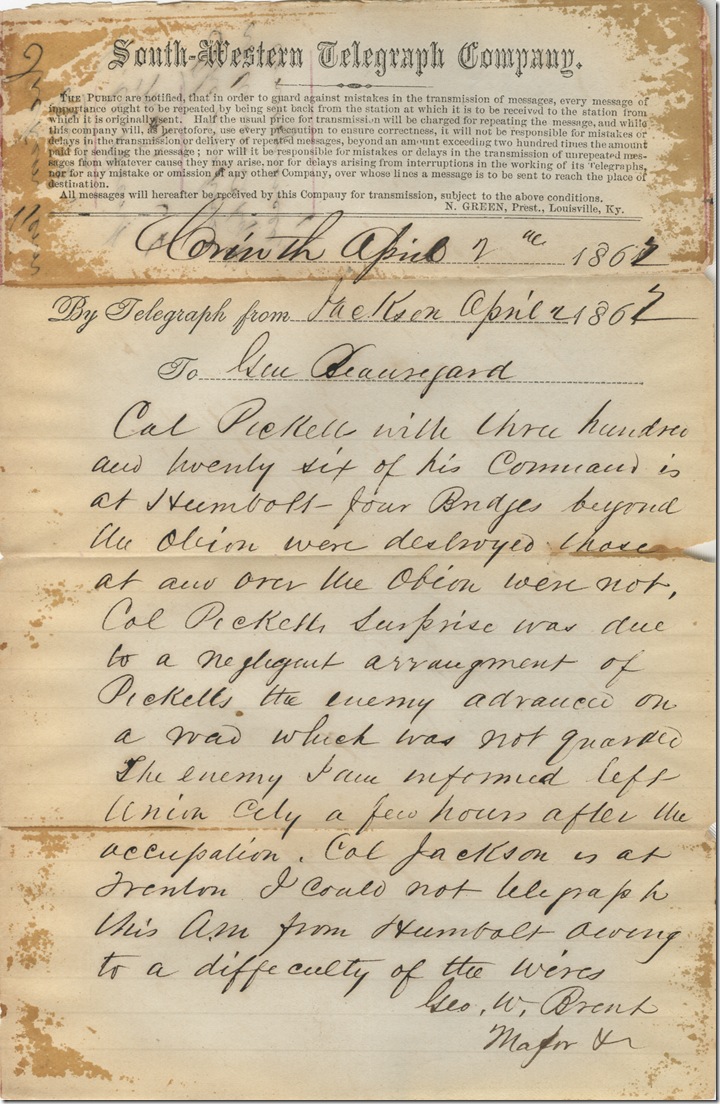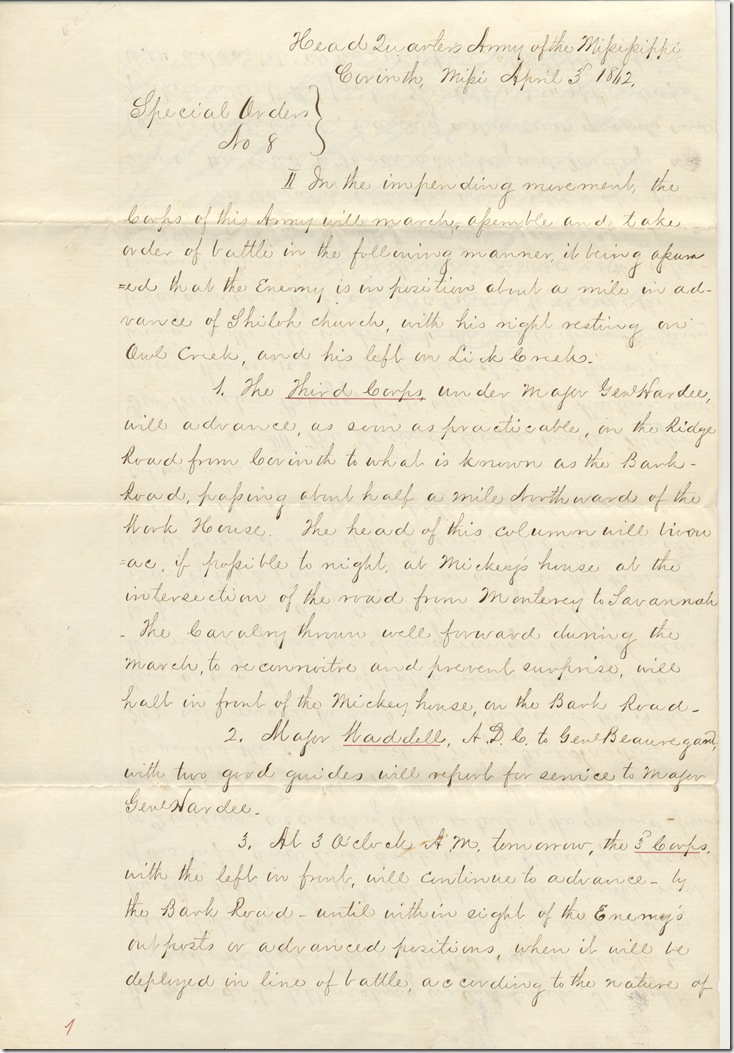
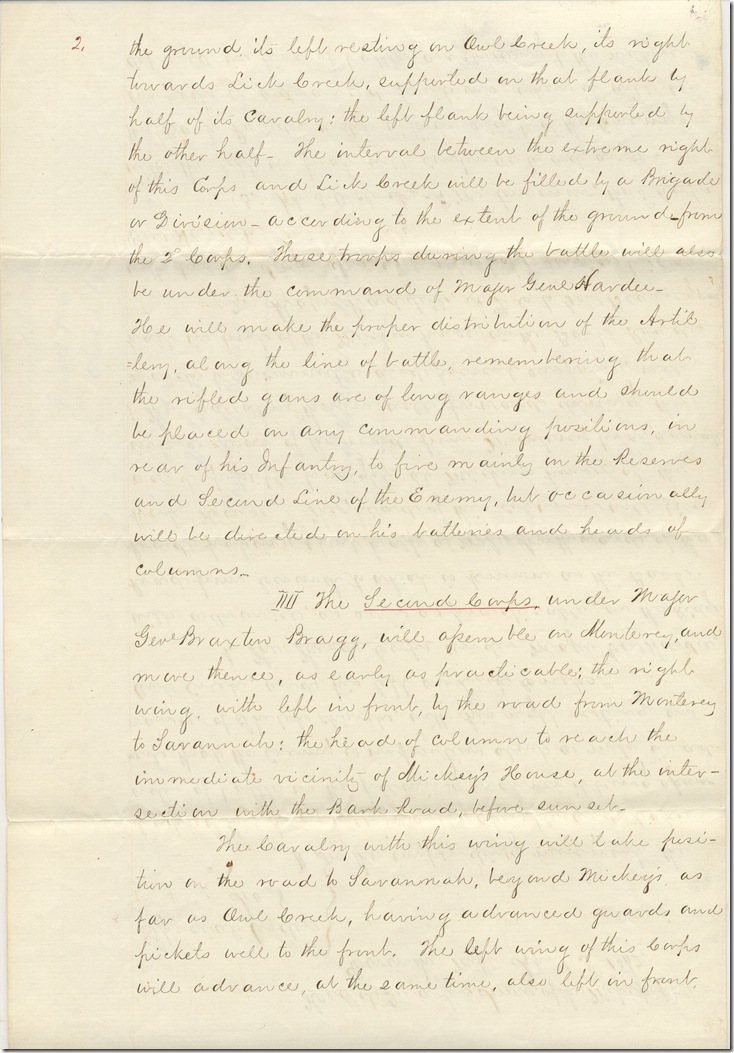
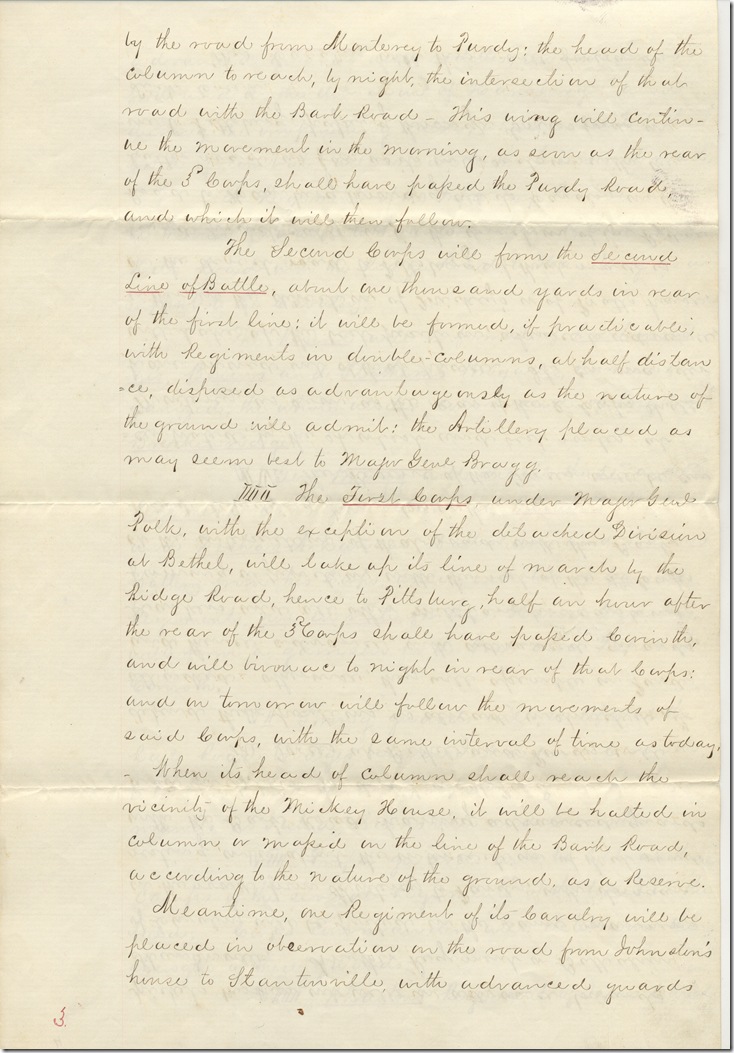
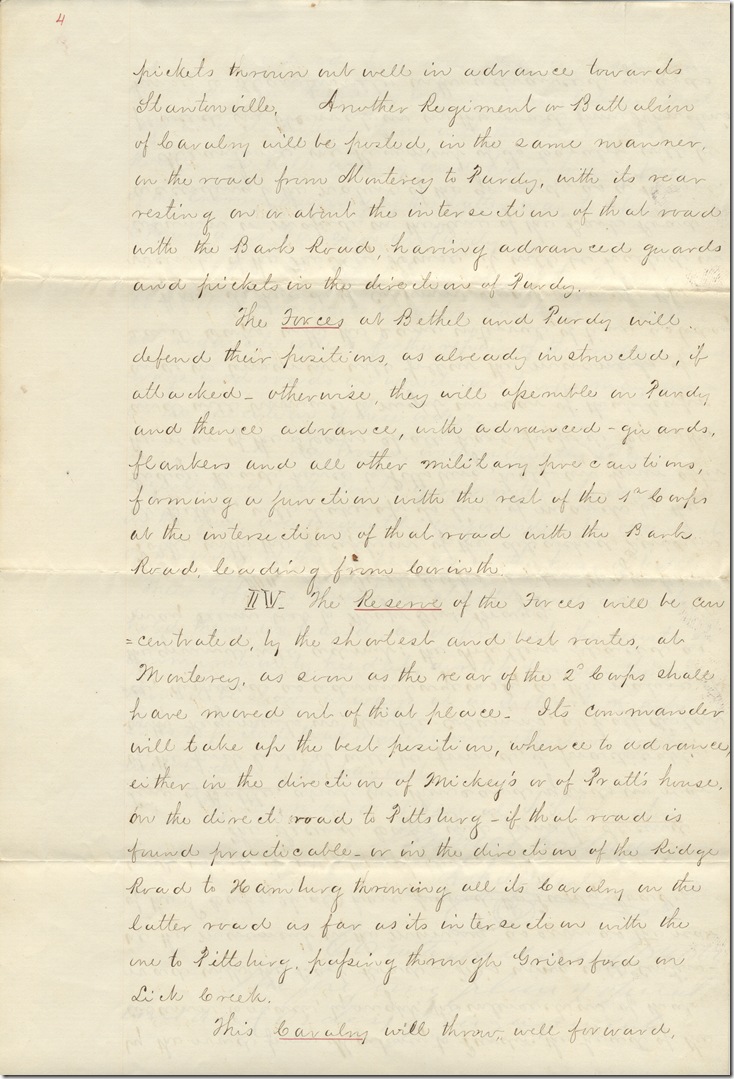
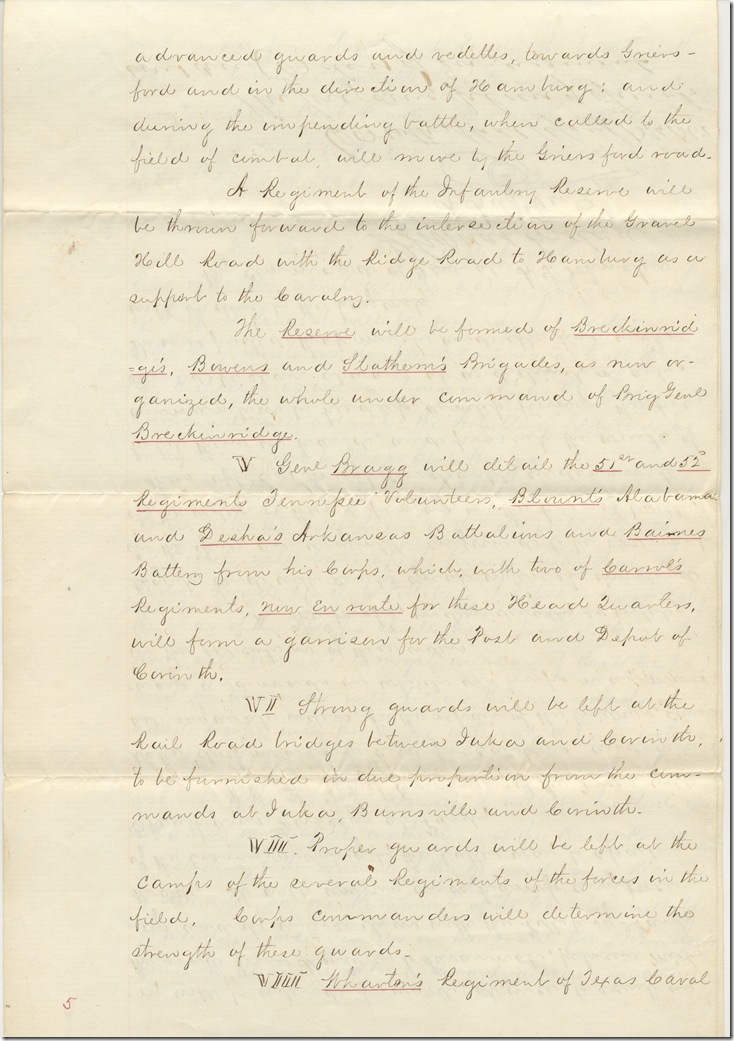
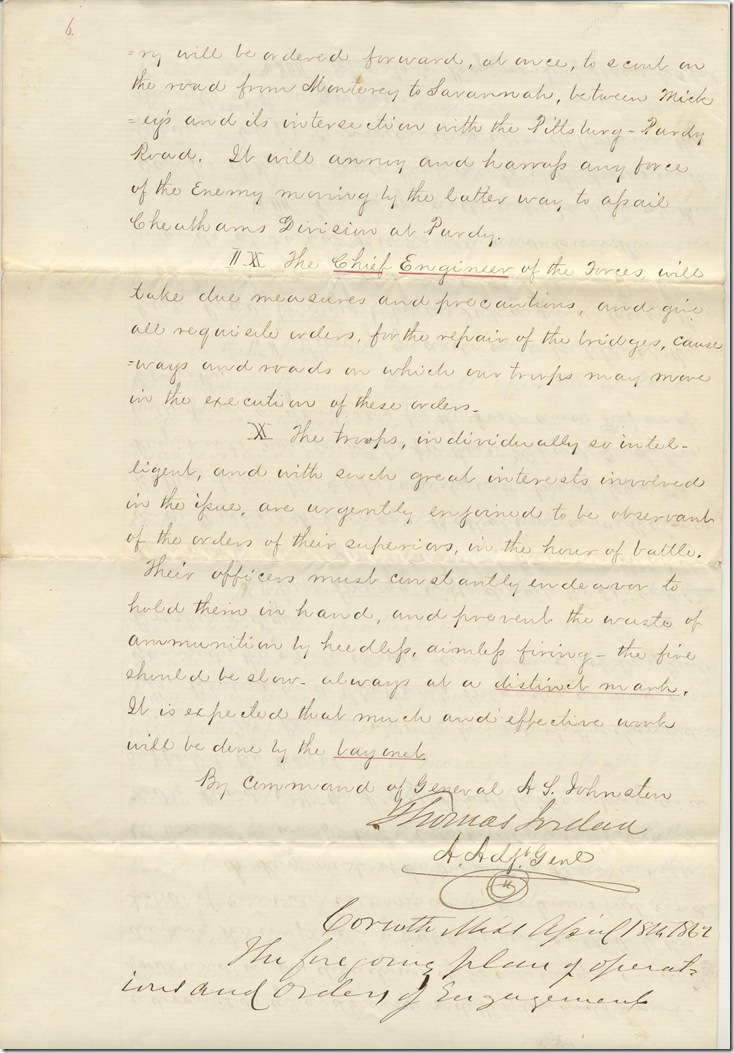
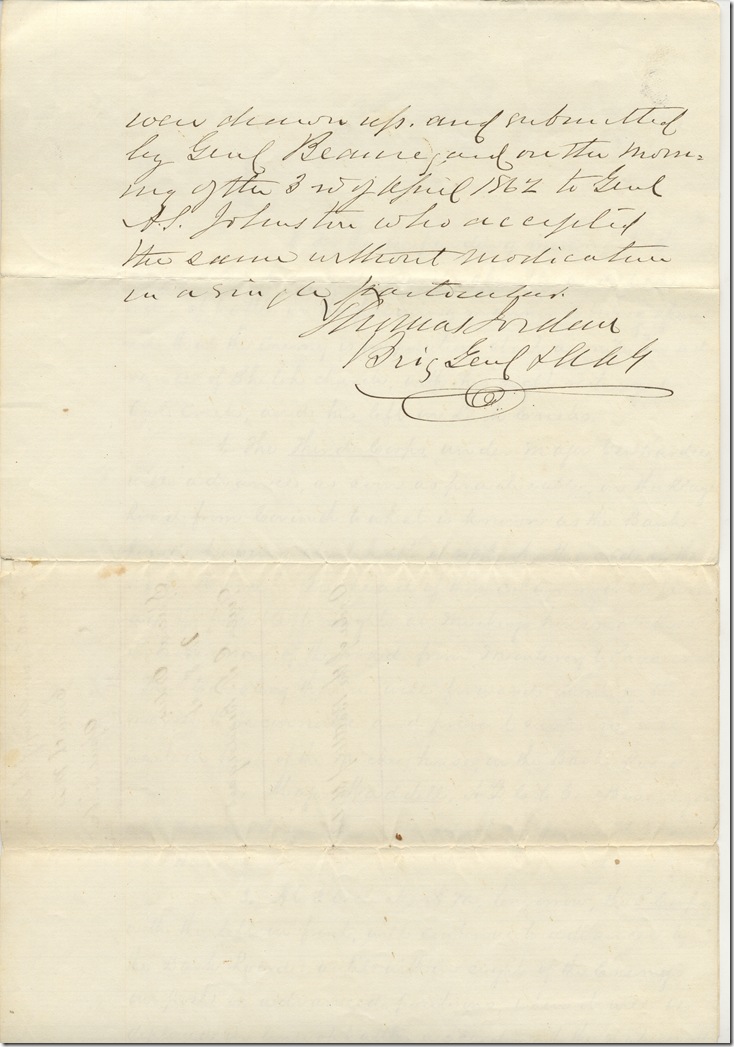
Transcript:
Head Quarters Army of the Mississippi
Corinth, Missi April 3 1862
Special Orders
No 8
I. In the impending movement, the Corps of this Army will march, assemble and take order of battle in the following manner, it being assumed that the enemy is in position about a mile in advance of Shiloh church, with his right resting on Owl Creek, and his left on Lick Creek.
1. The Third Corps, under Major Genl. Hardee, will advance, as soon as practicable, on the Ridge Road from Corinth to what is known as the Bank Road, passing about half a mile Northward of the __ House. The head of this column will bivouac, if possible tonight, at Mickey’s house at the intersection of the road from Monterey to Savannah. The Cavalry thrown well forward during the march, to reconnoitre and prevent surprise, will halt in front of Mickey house, on the Bank Road.
2. Major Waddell, A.D.C. to Genl. Beauregard, with two good guides will report for service to Major Genl. Hardee
3. At 3 o’clock A.M. tomorrow, the 3 Corps with the left in front will continue to advance—by the Bank Road—until within sight of the Enemy’s outposts or advanced positions, when it will be deployed in line of battle, according to the nature of the ground, its left resting on Owl Creek, its right towards Lick Creek, supported on the flank by half of its Cavalry: the left flank being supported by the other half—The interval between the extreme right of this Corps and Lick Creek will be filled by a Brigade or Division—according to the extent of the ground—from the 2 Corps. These troops during the battle will also be under the command of Major Genl. Hardee—He will make the proper distribution of the Artillery, along the line of battle, remembering that the rifled guns are of long ranges and should be placed in any commanding positions, in rear of his Infantry, to five mainly in the Reserves and Second Line of the Enemy, but occasionally will be directed on his batteries and heads of columns.
II. The Second Corps, under Major Genl. Braxton Bragg, will assemble on Monterey, and move thence, as early as practicable; the right wing, with left in front, by the road from Monterey to Savannah: the head of column to reach the immediate vicinity of Mickey’s House, at the intersection with the Bank Road, before sunset.
The Cavalry with this wing will take position on the road to Savannah, beyond Mickey’s as far as Owl Creek, having advanced guards and pickets well to the front. The left wing of this Corps will advance, at the same time, also left in front, by the road from Monterey to Purdy: the head of the column to reach, by night, the intersection of that road with the Bank Road—This wing will continue the movement in the morning, as soon as the rear of the 3 Corps shall have passed the Purdy Road and which it will then follow.
The Second Corps will form the Second Line of Battle, about one thousand yards in rear of the first line: it will be formed, if practicable, with Regiments in double columns, at half distance, dispersed as advantageously as the nature of the ground will admit: the Artillery placed as may seem best to Major Genl. Bragg.
III. The First Corps, under Major Genl. Polk, with the exception of the detached Division at Bethel, will take up its line of march by the Ridge Road, hence to Pittsburg, half an hour after the rear of the 3 Corps shall have passed Corinth, and will bivouac tonight in rear of that Corps: and on tomorrow will follow the movement of said Corps, with the same interval of time as today.
When its head of column shall reach the vicinity of the Mickey House, it will be halted in column or massed on the line of the Bank Road, according to the nature of the ground, as a Reserve.
Meantime, one Regiment of its Cavalry will be placed in observation on the road from Johnston’s house to Stantonville, with advanced guard pickets thrown out well in advance towards Stantonville. Another Regiment or Battalion of Cavalry will be posted, in the same manner, on the road from Monterey to Purdy, with its rear resting on or about the intersection of that road with the Bank Road, having advanced guards and pickets in the direction of Purdy.
The forces at Bethel and Purdy will defend their positions, as already instructed, if attacked—otherwise, they will assemble on Purdy and thence advance, with advanced-guards, flankers, and all other military precautions, forming a junction with the rest of the 1s Corps at the intersection of that road with the Bank Road, leading from Corinth.
IV. The Reserve of the forces will be concentrated, by the shortest and best routes, at Monterey, as soon as the rear of the 2 Corps shall have moved out of that place. Its commander will take up the best position, whence to advance, either in the direction of Mickey’s or of Pratt’s house, on the direct road to Pittsburg—if that road is found practicable—or in the direction of the Ridge Road to Hamburg throwing all its Cavalry on the latter road as far as its intersection with the one to Pittsburg passing through Griersford on Lick Creek.
This Cavalry will throw well forward advanced guards and vedettes, towards Griersford and in the direction of Hamburg: and during the impending battle, when called to the field of combat, will move by the Griersford road.
A Regiment of the Infantry Reserve will be thrown forward to the intersection of the Gravel Hill Road with the Ridge Road to Hamburg as a support to the Cavalry.
The Reserve will be formed of Breckinridge’s Bowers and Stathem’s Brigades, as now organized, the whole under command of Brig Genl Breckinridge.
V. Genl. Bragg will detail the 51 and 52 Regiments Tennessee Volunteers, Blount’s Alabama and Desha’s Arkansas Battallions and Baines Battery from his Corps, which with two of Carvel’s Regiments, now en route for these Head Quarters, will form a garrison fro the Post and Depot of Corinth.
VI. Strong guards will be left at the Rail Road bridges between Luka and Corinth, to be furnished in due proportion from the commands at Luka, Burnsville and Corinth.
VII. Proper guards will be left at the camps of the several Regiments of the forces in the field. Camp commanders will determine the strength of these guards.
VIII. Wharton’s Regiment of Texas Cavalry will be ordered forward, at once, to scout the road from Monterey to Savannah, between Mickey’s and its intersection with the Pittsburg-Purdy Road. It will annoy and harass any force of the Enemy moving by the latter way, to assail Chathams Division at Purdy.
IX. The Chief Engineer of the Forces will take due measures and precautions, and give all requisite orders, for the repair of the bridges, causeways and roads on which our troops may move in the execution of these orders.
X. The troops, individually so intelligent, and with such great interests involved in the issue, are urgently enjoined to be observant of the orders of their superiors, in the hour of battle. Their officers must constantly endeavor to hold them in hand, and prevent the waste of ammunition by heedless, aimless firing—the fire should be slow—always at a distinct mark. It is expected that much and effective work will be done by the bayonet.
By command of General Johnston
Citation: Confederate States of America. Army of the Mississippi, orders for the battle of Shiloh. Corinth, Miss; 3 April 1862. AMs 359/15
